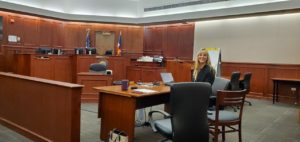Communication studies isn’t usually the first field of study people consider as preparation for law school. However, Leslie Schenk’s (’21) story shows why it’s a great fit for those interested in a legal career.
Public singing and public speaking
 Schenk originally planned on becoming a professional musician. As she was graduating from Rocky Mountain High School in Fort Collins and starting her studies at CSU, she began questioning these plans.
Schenk originally planned on becoming a professional musician. As she was graduating from Rocky Mountain High School in Fort Collins and starting her studies at CSU, she began questioning these plans.
“When I was trying to do [music] as a career, I didn’t enjoy it anymore,” Schenk says. “So I sat down one day and made a list of all the things I wanted to do in school or a job: I love public speaking and writing, I want to work directly with people, I want to do something difficult, something that will be different every day, and I want to be involved in my community. So in looking at various different career options I got turned on to prosecution, and it was like a beam-of-light-from-the-sky moment—I felt like I found what I was made to do.”
Schenk continued her musical involvement on campus, singing in the University Chorus and serving as president of first the Concert Choir and then Mosaic A Cappella. Her focus in the classroom, however, turned to public speaking, writing, and working with the community. This brought her to communication studies.
A passion for community service
Schenk took communication studies courses at CSU, then added minors in history and legal studies. She heard about the Center for Public Deliberation (CPD), but it wasn’t until her junior year when she took a persuasion course with Professor Martín Carcasson, Director of the CPD, that she decided to apply to their student associate program.
“It ended up being one of the most rewarding experiences of my time in college,” Schenk says. “One of my favorite events that I got to work on was a Women’s Intergenerational Dialogue. We ended up bringing in over 60 participants all ranging in age from teenagers to their hundreds!”
Working with and for the local community is also what excites Schenk about prosecutorial work. Her internship at the District Attorney’s Office in Fort Collins during her first year at CSU cemented her desire to pursue law.
After graduating from CSU in 2021, Schenk enrolled at the University of Denver, where she is in the second year of their three-year law school program. She is also an intern in the Denver District Attorney’s Office’s Cold Case Unit. After graduation, Schenk plans to start her career as a prosecutor. She has an eye on someday starting her own mediation practice or working for the US Department of Justice, too.
Communication in the courtroom
“My Communication Studies degree has really given me an edge when it comes to trial work,” Schenk says. “Some of my favorite classes were Studies in Persuasion and Advanced Public Speaking, which taught me both the psychology and practical skills behind being a great presenter. Understanding what persuasive techniques work and why, and appreciating the ethical implications behind our speech has given me a level of comfort in court and in front of juries that I know I wouldn’t have without my degree.”
Schenk advises current CSU students to be kind, to get involved, and to make a genuine effort to get to know your advisors and professors: “They want you to succeed, and these are people who could be part of your professional support network well into your career.”
We are excited to follow Schenk’s continuing success and wish her well in her final year of law school and beyond!
To learn more about CSU’s undergraduate Communication Studies degree program, including the accelerated and online programs, please visit https://communicationstudies.colostate.edu/undergraduate-program/.